Skill East 2019 organized by CII Eastern Region saw a host of industry members participating in the event as speakers and session moderators. This was a rare opportunity for NSN to seek industry views on skill development and vocational training, particularly from Mining and Painting industries. Thanks to CII, we spoke with few industry members who have been playing an active role in CII Eastern Region.
Here we go with brief Skill Talks from Mr Shubhenjit Chaudhuri, Co Chairman, Skill Development Sub-committee CII ER & MD, Tata Pigments Ltd; Mr Pramod Kumar Patra, Vice President & Unit Head, TRB Iron Ore Mines, Jindal Stainless Steel and Power Ltd; Mr Pradipta Mohanty, Vice Chairman, CII Odisha State Council and Chairman, SNM Group; ; Mr Pradeep Purohit CII-Member, Sub-committee on Skill Development; Mr B K Thakur, Director – HR , NALCO;
Shubhenjit Chaudhuri, Co Chairman, Skill Development Sub-committee CII ER & MD, Tata Pigments Ltd
“We manufacture pigments. Like any other industry, we need skilled workforce for the entire chain from raw material to the finished product. We also have pumps, motors circuits and instruments; while the officers are all engineers, the workforce on the shop floor is one area where we find an issue. Workers do not have the practical understanding of how things works and what is the impact of different chemicals, how tests can be done etc. Hence we set standards and they follow it mechanically.
For electrical work, maintenance of machines, we hire people from ITIs. The pigment industry is a specialised and being a small industry we have drive the curriculum upgradation in technical training institutes. Faculty development is another area where have to impart latest knowledge and train them in latest technology and infrastructure. They need to understanding of the chemistry aspects, machines, what improves the productivity. We also make paint and many of these points are valid for paint manufacturing too.
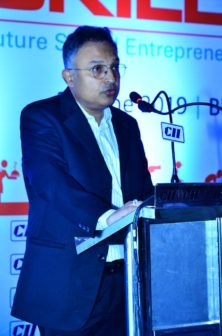 With regard to painting skills, the PCSC is working on the quality of painters. Essentially, paint is something to protect the surface and also gives an aesthetic value. So the surface has to be prepared well such that the paint will adhere to that.
With regard to painting skills, the PCSC is working on the quality of painters. Essentially, paint is something to protect the surface and also gives an aesthetic value. So the surface has to be prepared well such that the paint will adhere to that.
There are many advanced painting technologies being adopted across the world. India has also tried to adopt them. Each surface has its own criticality. If I paint on top of rust the entire paint will come of, so I have to first clean it but also make sure the pipe does not leak. Even if I bring these theoretical inputs the availability of people who are skilled to do it is not much and the number of centres giving this kind of training is very less.
We also are trying to start some initiatives, Berger is also doing some training but the Sector Council should do take this up. Just like the hospitality industry, we would not take anybody randomly, there has to be some certification. It is a highly skilled job like a cook, so certification programs are essential. Like what everyone was talking about in India you acquire a lot of theoretical skills but on the job you need strong vocational skills.”
Mr Pramod Kumar Patra, Vice President & Unit Head, TRB Iron Ore Mines, Jindal Stainless Steel and Power Ltd
“In the mining industry, there are many with low literacy level, many come from tribal areas, we have to take them to a normal literacy level, develop their attitude, help them adapt to changes happening in the community and industry. To cope with changes in technology, skills are required in all respects, not only for performance, but also statutory purposes, R&D is also required. Skills are needed on the shop floor, middle management, top leadership and at every level. We have to accept the changes of technology and digitization to contribute to Make in India movement. The equipment, we operate are very advanced, we interact with vendors and equipment suppliers, strategic planning is required so there shouldn’t be a gap between planner, executor and others.
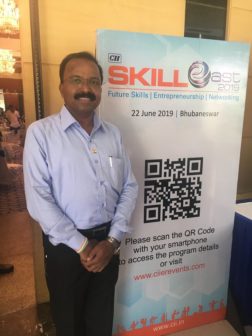 After the Mining Act, many rules have come up for excavation, sustainable mining, taking care of society, CSR, environment, shifting the materials to the plants. The infrastructure connecting from the mines to the destination is very poor, it is mostly dependent on roads, logistics have to improve, new railways lines, ports have to come up.
After the Mining Act, many rules have come up for excavation, sustainable mining, taking care of society, CSR, environment, shifting the materials to the plants. The infrastructure connecting from the mines to the destination is very poor, it is mostly dependent on roads, logistics have to improve, new railways lines, ports have to come up.
We do not get good engineers, our challenge is to develop the middle and low range people by motivating them and giving technology support to move up the ladder, they are the foundation of the industry and they will not change their jobs. The planners and policy makers have to accept the changes, there has to be smooth execution, continuous learning and change in the attitude of senior people.”
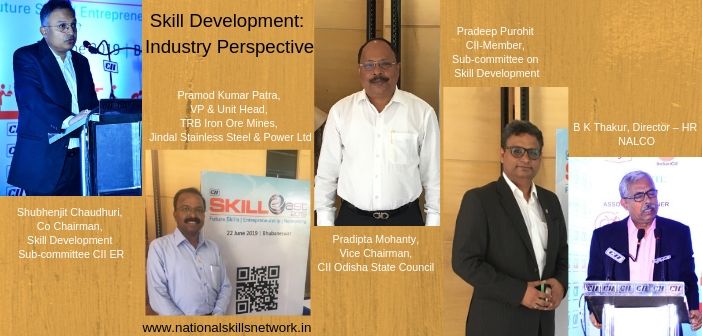
Pradipta Mohanty, Vice Chairman, CII Odisha State Council and Chairman, SNM Group
“India has a wealth of minerals. We manufacture iron, bauxite and other chemicals. The last time we produced 115 million tons of iron ore. But it’s largely semi-mechanised and manual. Like all industries, more of automation and mechanisation is introduced. Technology has to be a part of mining industry, we are lagging behind because mining is still not considered as an industry by the government so we don’t have the benefits which others have. However here from low level skill to excavator, driver and all roles have to be trained. CII was also planning for a skill development centre in the eastern region but we are not aware of the current status. Most of mining industry even the finance and HR functions has to be organised and formalised.
Mining needs energy and petroleum is the key resource for us so maybe we should move to electrical vehicles as our consumption is very high there. Slowly miners are shifting to solar energy, for all data transmission we have used almost 100 kilo watt solar power.
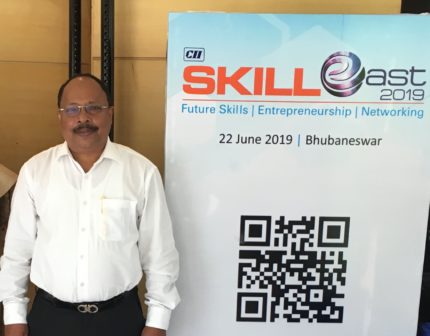 We get a lot of machines from outside but we don’t have people who can operate and maintain them. We have screens and mobile pressing machines from other countries but not many technicians. Technology has not penetrated much into the mining sector. We have the big howling dumpers, but we don’t have people to drive them. From the very beginning the skillset is very low in this industry, maybe with the Skill Development Centre coming up we can improve it. The feasibility report is being prepared and then we will know who the stakeholders are. The location is being looked at, it maybe in Bhubaneswar a residential school so that it’s beneficial to all and connectivity is easier. Mine owners will partner with us as it will help them too, if they get good people they will get better returns and productivity will increase.”
We get a lot of machines from outside but we don’t have people who can operate and maintain them. We have screens and mobile pressing machines from other countries but not many technicians. Technology has not penetrated much into the mining sector. We have the big howling dumpers, but we don’t have people to drive them. From the very beginning the skillset is very low in this industry, maybe with the Skill Development Centre coming up we can improve it. The feasibility report is being prepared and then we will know who the stakeholders are. The location is being looked at, it maybe in Bhubaneswar a residential school so that it’s beneficial to all and connectivity is easier. Mine owners will partner with us as it will help them too, if they get good people they will get better returns and productivity will increase.”
Pradeep Purohit, CII Member, Sub-committee on skill development and Vice President – Star Cement
“We need skilled workforce for operations so we are look out for ITI and polytechnics and skill them up to fit into various our job roles. This supports local population, however, it has limitation since we can’t employ many people. The verticals under which we have our CSR activities are tailoring, beauticians, music courses. The focus area for CSR is skills and livelihood enablement.
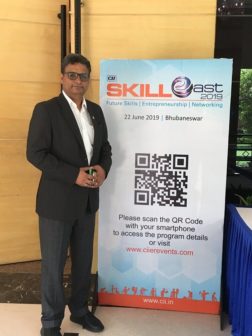 In our company, cement manufacturing happens at Guwahati, Assam, Meghalaya. Though our job ends at selling cement, we need a broader ecosystem in the construction sector, we don’t consider ourselves only a part of cement, we are also a major supplier to construction industry in eastern India.
In our company, cement manufacturing happens at Guwahati, Assam, Meghalaya. Though our job ends at selling cement, we need a broader ecosystem in the construction sector, we don’t consider ourselves only a part of cement, we are also a major supplier to construction industry in eastern India.
The corporates have to come on board, we need more collaboration, so that the industry flourishes, skilled manpower is available for plywood manufactures.
CREDAi, CII and Star Cement are part of one project, skill development is being taken up, more focused towards construction, builders are benefited, we hold a market share of 20 % after skilling it grows by 10% so we will also grow, and we can make use of the opportunities. It is not possible for state or central government to drive the target without cooperation from industry, the major stakeholders, they have to come forward to handle this magnitude.
We should facilitate entrepreneurship. We’ve partnered with Usha Sewing Machines, they skill our candidates under CSR and resources are given by Star Cement. After training, if the candidate is interested, she is given the sewing machine, so that she can be self-reliant. We’ve supported more 7000 – 8000 people comprising 1650 families and it is an ongoing process.
Today cement manufacturing and material handling is all automated and mechanised. We need drivers, earth moving machine operators, helpers, electricians, material handling equipment, maintenance and supervision, diggers and riggers, – we source people from local community, we might not get desired skills, we send them to regional institutes for training.”
B K Thakur, Director – HR , NALCO
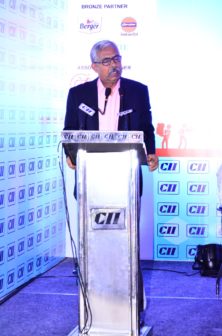 “Operations have to be cost effective, and we have to deliver quality, so skilling is very important. Skilling has to be a continuous effort, this is in-built into our thought process. We are multi sectoral, whatever is relevant to mining we impart those skills.
“Operations have to be cost effective, and we have to deliver quality, so skilling is very important. Skilling has to be a continuous effort, this is in-built into our thought process. We are multi sectoral, whatever is relevant to mining we impart those skills.
Apart from statutory training, for sectors like mining and power, skilling has to be understood with job requirements, real job needs have to be identified,
We are trying to scan the industry requirements and benchmark with others, the recent development in this area, we focus on mines per se, we surveyed drilling, blasting, and training on equipment, (handling equipment is a major concern of the mining industry) static and mobile equipment, most of them are imported.”




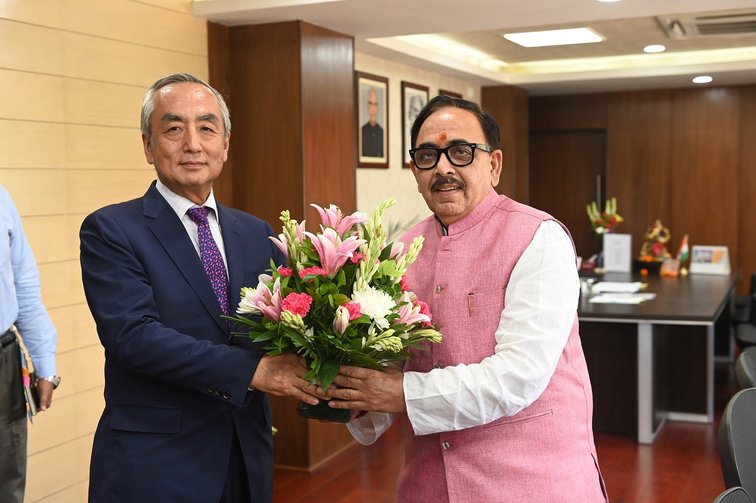









Comments 1